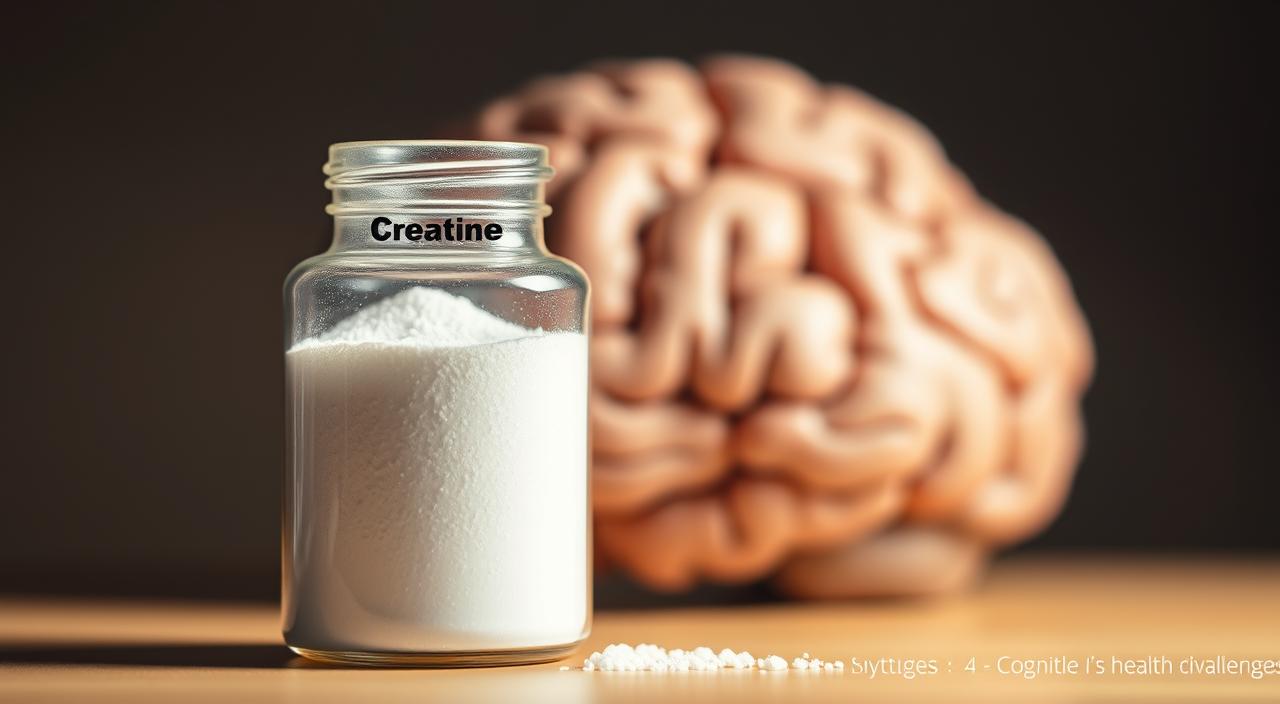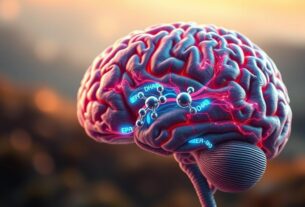Recent studies have shown that Creatine May Help with Alzheimer’s and Cognitive Problems has potential benefits for individuals with Alzheimer’s disease, improving cognitive function and overall brain health.
The potential benefits of creatine for cognitive issues have sparked interest in the scientific community. As research continues to emerge, it becomes increasingly clear that creatine may play a role in supporting brain health.
By examining the available data and research findings, this article aims to provide a comprehensive overview of how creatine supplementation can impact cognitive problems and Alzheimer’s disease.
Understanding Creatine: A Natural Compound for Brain Health
The role of creatine in energy metabolism extends beyond muscle function to potentially support brain health. Creatine is a naturally occurring compound that plays a crucial role in energy production within the body.
What Is Creatine and How Does It Work?
Creatine is an organic compound made up of three amino acids: arginine, glycine, and methionine. It is primarily stored in muscles, where it is used to fuel high-intensity activities.
The Biochemistry of Creatine
Creatine’s role in the body is closely linked to its ability to replenish ATP stores, providing energy for various cellular processes. This process is vital for maintaining optimal cellular function.
Natural Production vs. Supplementation
While the body naturally produces creatine, supplementation can significantly boost its levels, particularly in the brain, potentially enhancing memory enhancement and cognitive function.
Beyond Muscle Building: Creatine’s Role in the Body
Creatine’s benefits extend far beyond muscle building. It plays a critical role in various bodily functions, including those related to neuroprotection.
Creatine’s Function in Different Organs
Creatine is not just important for muscles; it’s also found in other organs, including the heart and brain, where it supports energy metabolism.
The Brain’s Dependence on Creatine
The brain relies heavily on creatine for energy, particularly during periods of high activity or stress. Ensuring adequate creatine levels may be crucial for maintaining optimal brain function.
By understanding creatine’s role in the body, particularly in the brain, we can better appreciate its potential benefits for brain health and cognitive function.
The Science Behind Creatine and Brain Function
The science behind creatine’s effects on the brain involves its support of cellular energy and neurotransmitter regulation. Creatine plays a crucial role in maintaining the energy balance within brain cells, which is vital for proper cognitive function.
How Creatine Supports Cellular Energy in the Brain
Creatine supplementation enhances the brain’s energy metabolism by supporting the ATP-creatine phosphate energy system. This system is critical for maintaining the high energy demands of brain cells.
The ATP-Creatine Phosphate Energy System
The ATP-creatine phosphate system is a key energy buffer in the brain, rapidly replenishing ATP stores during high-energy demand periods. Creatine supplementation increases the availability of creatine phosphate, thereby enhancing this energy buffering capacity.
Brain Energy Metabolism and Creatine
Creatine’s role in brain energy metabolism is closely linked to its ability to support the ATP-creatine phosphate system. By ensuring a stable energy supply, creatine helps maintain optimal brain function and mental clarity.
Creatine’s Impact on Neurotransmitters
Creatine influences various neurotransmitter systems, contributing to its neuroprotective effects. The modulation of dopamine, serotonin, and glutamate by creatine has been observed in several studies.
Effects on Dopamine and Serotonin
Creatine supplementation has been shown to affect dopamine and serotonin levels, neurotransmitters critical for mood regulation and cognitive processes. This modulation can contribute to improved cognitive function.
Glutamate Regulation and Neuroprotection
Creatine’s regulation of glutamate, a major excitatory neurotransmitter, is vital for preventing excitotoxicity and promoting neuroprotection. By mitigating excessive glutamate release, creatine helps protect against neuronal damage.
Creatine May Help with Alzheimer’s and Cognitive Problems: Research Overview
As research continues to uncover the effects of creatine on brain function, its potential benefits for individuals with Alzheimer’s and cognitive impairments are becoming increasingly apparent. Creatine, widely known for its use in enhancing athletic performance, is now being studied for its role in supporting brain health and potentially mitigating cognitive decline associated with neurodegenerative diseases.
Key Studies Linking Creatine to Cognitive Benefits
Several studies have investigated the relationship between creatine supplementation and cognitive function, particularly in the context of Alzheimer’s disease. These studies provide valuable insights into the potential benefits of creatine for brain health.
Human Clinical Trials Results
Human clinical trials have shown promising results regarding creatine’s impact on cognitive function. Some studies have reported improvements in memory and cognitive processing in individuals with mild cognitive impairment. However, more research is needed to fully understand creatine’s effects in humans.
Animal Model Research Findings
Animal model research has provided further evidence of creatine’s potential cognitive benefits. Studies using animal models of Alzheimer’s disease have found that creatine supplementation can lead to improved cognitive performance and reduced markers of neurodegeneration. These findings suggest that creatine may have neuroprotective effects.
Mechanisms of Neuroprotection
The potential neuroprotective effects of creatine are thought to be mediated through several mechanisms. Understanding these mechanisms is crucial for appreciating how creatine may support brain health.
Antioxidant Properties of Creatine
One of the key mechanisms is creatine’s antioxidant properties. Creatine has been shown to have antioxidant effects, which can help protect brain cells from oxidative stress and damage. This is particularly relevant in the context of neurodegenerative diseases like Alzheimer’s, where oxidative stress is thought to play a significant role.
Mitochondrial Support and Brain Cell Preservation
Creatine also supports mitochondrial function, which is essential for maintaining the health and energy requirements of brain cells. By enhancing mitochondrial energy production, creatine may help preserve brain cell function and potentially slow the progression of neurodegenerative diseases.
Alzheimer’s Disease: How Creatine Could Help
Alzheimer’s disease is characterized by progressive cognitive decline and neuronal loss. Recent research has explored the potential therapeutic benefits of creatine supplementation in addressing some of the disease’s underlying pathologies.
Addressing Energy Deficits in Alzheimer’s Brains
Alzheimer’s disease is marked by significant metabolic dysfunction, leading to energy deficits in the brain. Creatine supplementation may help restore energy balance, potentially mitigating some of the disease’s effects.
Metabolic Dysfunction in Alzheimer’s Pathology
Metabolic dysfunction is a hallmark of Alzheimer’s disease, affecting the brain’s ability to utilize energy efficiently. Studies have shown that this dysfunction contributes to the progression of the disease.
Creatine’s Role in Restoring Energy Balance
Creatine supplementation increases the availability of phosphocreatine, which is crucial for maintaining ATP levels in the brain. By enhancing energy availability, creatine may help counteract the metabolic deficits observed in Alzheimer’s disease.
Potential for Slowing Disease Progression
The potential of creatine to slow the progression of Alzheimer’s disease is an area of significant interest. Research suggests that creatine may exert neuroprotective effects, potentially influencing key aspects of the disease’s pathology.
Effects on Amyloid Beta and Tau Proteins
Creatine may influence the accumulation of amyloid beta and tau proteins, which are central to Alzheimer’s disease pathology. By potentially reducing the impact of these proteins, creatine could help slow disease progression.
Preserving Neural Connections and Function
Preserving neural connections is critical in maintaining cognitive function in Alzheimer’s patients. Creatine’s neuroprotective effects may help in preserving these connections, thereby supporting cognitive health.
| Potential Benefits | Description |
| Energy Restoration | Creatine supplementation may help restore energy balance in Alzheimer’s brains. |
| Neuroprotection | Creatine may exert neuroprotective effects, potentially slowing disease progression. |
| Preservation of Neural Connections | Creatine may help preserve neural connections, supporting cognitive health. |
Cognitive Enhancement Benefits of Creatine
Emerging research suggests that creatine may play a significant role in improving memory and mental clarity. As a supplement, creatine has been widely used to enhance athletic performance, but its benefits extend beyond physical improvement.
Memory and Learning Improvements
Creatine supplementation has been shown to enhance both short-term and long-term memory. This is crucial for individuals looking to improve their learning capacity and retain information more effectively.
Short-term Memory Benefits
Studies have indicated that creatine can improve short-term memory by enhancing the brain’s ability to store and recall information over short periods. This is particularly beneficial for tasks that require quick recall and decision-making.
Long-term Memory and Learning Capacity
In addition to short-term benefits, creatine has been found to support long-term memory and learning. By potentially increasing the brain’s energy reserves, creatine may facilitate more efficient learning processes.
Focus and Mental Clarity Effects
Creatine’s impact on cognitive function also includes improvements in focus and mental clarity. This can be attributed to its role in enhancing the energy supply to brain cells.
Attention Span Enhancement
By potentially boosting the brain’s energy levels, creatine supplementation may help individuals maintain focus over longer periods, thus enhancing their attention span.
Cognitive Processing Speed Improvements
Furthermore, creatine may contribute to faster cognitive processing speeds, enabling quicker reaction times and more efficient information processing.
| Cognitive Benefit | Description |
| Short-term Memory | Improved recall and storage of information over short periods |
| Long-term Memory | Enhanced learning capacity and information retention |
| Focus and Mental Clarity | Better concentration and mental processing efficiency |
Dietary Sources vs. Supplemental Creatine for Brain Health
For optimal brain health, understanding the role of creatine from food sources versus supplements is crucial. Creatine is an essential compound for energy production in cells, particularly in the brain and muscles.
Food Sources Rich in Creatine
Creatine is naturally found in various food sources, primarily in animal products. Consuming these foods can contribute to the body’s creatine levels.
Meat and Fish Content Analysis
Red meat, fish, and poultry are significant sources of dietary creatine. For instance, a 3-ounce serving of red meat can contain about 1-2 grams of creatine. Fish like salmon and tuna are also good sources.
Limitations of Dietary Creatine for Cognitive Benefits
While dietary sources can provide creatine, achieving therapeutic levels solely through food can be challenging due to variations in creatine content and individual dietary preferences. For example, vegetarians and vegans may have lower baseline creatine levels.
Different Forms of Creatine Supplements
Creatine supplements come in various forms, each with different characteristics. Supplementation can help achieve higher creatine levels than diet alone.
Creatine Monohydrate vs. Other Forms
Creatine monohydrate is the most researched form, known for its efficacy and safety. Other forms, like creatine citrate and creatine malate, are also available, though their benefits over monohydrate are still being studied.
Bioavailability and Brain Uptake Considerations
The bioavailability of creatine supplements and their ability to cross the blood-brain barrier are crucial for cognitive benefits. Research indicates that creatine monohydrate can effectively increase brain creatine levels.
| Form of Creatine | Bioavailability | Brain Uptake |
| Creatine Monohydrate | High | Effective |
| Creatine Citrate | Moderate | Limited Studies |
| Creatine Malate | Moderate | Limited Studies |
As noted by a researcher, “Creatine supplementation has the potential to support brain health by enhancing energy production and reducing oxidative stress.”
“Creatine supplementation is a promising adjunctive treatment for neurodegenerative diseases.”
In conclusion, while dietary sources provide some creatine, supplementation may be necessary to achieve optimal levels for brain health benefits.
Optimal Dosage and Supplementation Strategies
To maximize cognitive benefits from creatine, it’s essential to understand the optimal dosage and supplementation timing. Research has investigated various supplementation strategies to determine the most effective approaches for enhancing brain function.
Recommended Dosages for Cognitive Benefits
The optimal dosage of creatine for cognitive benefits is a subject of ongoing research. Studies suggest that a daily dosage between 3 to 5 grams is effective for cognitive enhancement.
Loading Phase vs. Maintenance Dosing
A loading phase, typically involving 20 grams of creatine per day for 5-7 days, can rapidly increase muscle and brain creatine levels. After the loading phase, a maintenance dose of 3-5 grams daily is recommended.
Age-Specific Dosage Considerations
Age can influence the optimal creatine dosage. Older adults may require adjusted dosages due to decreased muscle mass and potentially altered creatine metabolism.
Timing and Cycling Considerations
The timing of creatine supplementation can impact its effectiveness. Research suggests that taking creatine at specific times of the day may enhance its cognitive benefits.
Best Times of Day for Supplementation
Taking creatine in the morning or before a cognitive task may be beneficial. Some studies also suggest that post-workout supplementation can be effective, especially when combined with resistance training.
Cycling Protocols for Long-term Use
Cycling creatine, involving periods of supplementation followed by periods of non-use, may help maintain sensitivity to its effects. A common protocol involves 8 weeks of supplementation followed by 4 weeks off.
Safety Profile and Potential Side Effects
While creatine is generally considered safe, understanding its potential side effects is crucial for informed supplementation. Creatine supplementation has been extensively researched, and the majority of studies indicate that it is well-tolerated when used as directed.
Common Misconceptions About Creatine
Despite its safety, several misconceptions about creatine supplementation persist. Two of the most common myths surround kidney damage and water retention.
Debunking Kidney Damage Myths
Research has consistently shown that creatine supplementation does not cause kidney damage in healthy individuals. A study published in the Journal of the International Society of Sports Nutrition found no adverse effects on kidney function.
Water Retention and Weight Gain Facts
Creatine can cause initial water retention, leading to weight gain. However, this is not a permanent effect and typically subsides once the body adapts. As noted by
“Creatine supplementation can lead to initial water retention, but this effect is temporary.”
Journal of Strength and Conditioning Research
Who Should Exercise Caution with Creatine
Certain individuals should consult with a healthcare professional before starting creatine supplementation.
Pre-existing Medical Conditions
Individuals with pre-existing medical conditions, such as kidney or liver disease, should exercise caution. It’s essential to monitor health parameters while supplementing with creatine.
Medication Interactions
Creatine may interact with certain medications, including diuretics and blood pressure medications. Consulting a healthcare provider is advisable to avoid potential interactions.
Combining Creatine with Other Cognitive Enhancers
The potential of creatine to boost brain health is further amplified when combined with other cognitive enhancers. This synergistic approach can lead to enhanced cognitive function and overall brain well-being.
Synergistic Supplements for Brain Health
Certain supplements, when combined with creatine, may offer enhanced cognitive benefits. These include:
Omega-3 Fatty Acids and Creatine
Omega-3 fatty acids are known for their anti-inflammatory properties and support for brain health. When combined with creatine, they may enhance cognitive function and potentially offer neuroprotective effects.
B Vitamins and Antioxidant Combinations
B vitamins play a crucial role in energy production and neuronal function. Combining B vitamins and antioxidants with creatine may support overall brain health and cognitive performance.
Creating an Effective Cognitive Support Stack
To maximize cognitive benefits, it’s essential to create a well-rounded supplement stack. This involves:
Personalized Approaches Based on Needs
Individual needs and health status should guide the selection of supplements. A personalized approach ensures that the supplement stack is both safe and effective.
Monitoring and Adjusting Supplement Regimens
Regular monitoring of cognitive function and overall health is crucial. Adjustments to the supplement regimen may be necessary to optimize benefits and minimize potential side effects.
Lifestyle Factors That Enhance Creatine’s Cognitive Benefits
To maximize the cognitive benefits of creatine supplementation, it’s essential to consider lifestyle factors that can enhance its effects. Creatine works synergistically with certain lifestyle choices to improve brain health and cognitive function.
Exercise and Physical Activity Synergy
Exercise is a critical lifestyle factor that can enhance the cognitive benefits of creatine. Regular physical activity not only improves overall health but also boosts the effectiveness of creatine supplementation.
Aerobic Exercise Combinations
Aerobic exercises, such as running or cycling, when combined with creatine supplementation, can enhance cognitive function by improving cardiovascular health and increasing blood flow to the brain.
Resistance Training and Brain Health
Resistance training is another form of exercise that complements creatine supplementation. It promotes muscle strength and endurance, which can indirectly support brain health by enhancing overall physical function.
Diet and Hydration Considerations
A well-balanced diet and adequate hydration are also crucial for maximizing the cognitive benefits of creatine. Nutritional cofactors and proper hydration can significantly impact creatine’s effectiveness.
Importance of Adequate Water Intake
Adequate hydration is essential for creatine to work effectively. Dehydration can lead to decreased cognitive performance, negating the benefits of creatine supplementation.
Nutritional Cofactors That Enhance Effects
Certain nutrients, such as omega-3 fatty acids and antioxidants, can enhance the effects of creatine by supporting overall brain health and reducing oxidative stress.
Future Research Directions on Creatine for Neurological Health
As research into creatine’s effects on neurological health continues to evolve, new avenues for potential therapeutic applications are emerging. The growing body of evidence supporting creatine’s role in brain health has sparked interest in exploring its future research directions.
Ongoing Clinical Trials
Several ongoing clinical trials are investigating the potential benefits of creatine for various neurological conditions. These studies aim to provide more definitive evidence on creatine’s efficacy in improving neurological outcomes.
Current Studies in Alzheimer’s Patients
One area of focus is the use of creatine in Alzheimer’s disease. Clinical trials are examining whether creatine supplementation can slow disease progression or improve cognitive function in Alzheimer’s patients.
Research in Other Neurodegenerative Conditions
In addition to Alzheimer’s, researchers are also exploring the potential benefits of creatine in other neurodegenerative diseases, such as Parkinson’s and Huntington’s disease.
Emerging Applications for Neurological Conditions
Beyond current research, emerging applications for creatine in neurological health are being explored. These include its potential use in traumatic brain injury and stroke recovery.
Potential for Parkinson’s and Huntington’s Disease
Creatine’s neuroprotective effects may offer benefits for patients with Parkinson’s and Huntington’s disease, and further research is needed to fully understand its potential.
Traumatic Brain Injury and Stroke Recovery Applications
The use of creatine in traumatic brain injury and stroke recovery is also being investigated, with preliminary evidence suggesting potential benefits.
| Condition | Current Research Status | Potential Benefits |
| Alzheimer’s Disease | Ongoing clinical trials | Slowing disease progression, improving cognitive function |
| Parkinson’s Disease | Emerging research | Neuroprotection, improved motor function |
| Huntington’s Disease | Emerging research | Neuroprotection, delayed disease onset |
| Traumatic Brain Injury | Preliminary studies | Improved recovery, reduced injury severity |
Conclusion: Integrating Creatine into a Brain Health Strategy
Integrating creatine into a brain health strategy may have cognitive benefits and support overall brain health. Creatine supplementation has been explored for its potential to enhance cognitive function and mitigate neurodegenerative diseases.
A brain health strategy that includes creatine supplementation may be beneficial for individuals seeking to improve their cognitive abilities. The potential cognitive benefits of creatine supplementation are supported by research on its role in cellular energy production and neurotransmitter function.
By incorporating creatine into a comprehensive brain health plan, individuals can potentially support their brain health and cognitive function. This approach can be particularly valuable when combined with a balanced diet, regular exercise, and other lifestyle factors that promote overall well-being.
FAQ
What is creatine and how does it work in the brain?
Creatine is a naturally occurring compound that plays a crucial role in energy production in the brain. It helps support cellular energy and regulate neurotransmitters, which can lead to improved cognitive function and potentially even neuroprotection.
Can creatine help with Alzheimer’s disease?
Research suggests that creatine may help address energy deficits in Alzheimer’s brains and potentially slow disease progression. While more research is needed, the existing evidence is promising.
What are the cognitive enhancement benefits of creatine?
Creatine has been shown to improve memory, learning, focus, and mental clarity. These benefits can be particularly useful for individuals looking to enhance their cognitive performance.
Should I get creatine from dietary sources or supplements?
While dietary sources like red meat and fish contain creatine, supplements can provide a more concentrated dose. Different forms of creatine supplements are available, and the choice between them depends on individual preferences and needs.
What is the optimal dosage of creatine for cognitive benefits?
The recommended dosage of creatine for cognitive benefits varies, but most studies suggest a loading phase followed by a maintenance dose. Timing and cycling considerations can also impact effectiveness.
Is creatine safe to take, and are there any potential side effects?
Creatine is generally considered safe when taken as directed. However, common misconceptions and potential side effects should be considered, particularly for individuals with certain medical conditions.
Can I combine creatine with other cognitive enhancers?
Yes, creatine can be combined with other cognitive enhancers like omega-3 fatty acids, Ginkgo biloba, or Bacopa monnieri to create a synergistic cognitive support stack.
How can I maximize the cognitive benefits of creatine?
Regular exercise, a balanced diet, and adequate hydration can enhance the cognitive benefits of creatine. Lifestyle factors like these can play a crucial role in supporting brain health.
What does the future hold for creatine research in neurological health?
Ongoing clinical trials and emerging applications for neurological conditions are expected to further elucidate the potential benefits of creatine for brain health. As research continues to evolve, we may see new and innovative uses for creatine.
Can creatine be used for neuroprotection and brain health in general?
Yes, creatine’s neuroprotective effects and ability to support cellular energy make it a promising supplement for overall brain health and potentially even neuroprotection.





1 thought on “Creatine May Help with Alzheimer’s and Cognitive Problems. 2025!”